Editor’s Note: This is the seventh chapter of Romulus, by Jacob Abbott (published 1902).
VII. Rhea Silvia
Rhea Silvia, the mother of Romulus, was a vestal virgin, who lived in the kingdom of Latium about four hundred years after the death of Æneas. A vestal virgin was a sort of priestess, who was required, like the nuns of modern times, to live in seclusion from the rest of the world, and devote their time wholly and without reserve to the services of religion. They were, like nuns, especially prohibited from all association and intercourse with men.
Æneas himself is said to have founded the order of vestal virgins, and to have instituted the rites and services which were committed to their charge. These rites and services were in honor of Vesta, who was the goddess of Home. The fireside has been, in all ages and countries, the center and the symbol of home, and the worship of Vesta consisted, accordingly, of ceremonies designed to dignify and exalt the fireside in the estimation of the people. Instead of the images and altars which were used in the worship of the other deities, a representation of a fire-stand was made, such as were used in the houses of those days; and upon this sacred stand a fire was kept continually burning, and various rites and ceremonies were performed in connection with it, in honor of the domestic virtues and enjoyments, of which it was the type and symbol.
These fire-stands, as used by the ancients, were very different from the fire-places of modern times, which are recesses in chimneys with flues above for the passage of the smoke. The household fires of the ancients were placed in the center of the apartment, on a hearth or supporter called the focus. This hearth was made sometimes of stone or brick, and sometimes of bronze. The smoke escaped above, through openings in the roof. This would seem, according to the ideas of the present day, a very comfortless arrangement; but it must be remembered that the climate in those countries was mild, and there was accordingly but little occasion for fire; and then, besides, such were the habits of the people at this period of the world, that not only their pursuits and avocations, but far the greater portion of their pleasures, called them into the open air. Still, the fire-place was, with them as with us, the type and emblem of domestic life; and accordingly, in paying divine honors to Vesta, the goddess of Home, they set up a focus, or fire-place, in her temple, instead of an altar, and in the place of sacrifices they simply kept burning upon it a perpetual fire.
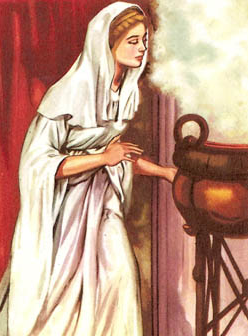
The priestesses who had charge of the fire were selected for this purpose when they were children. It was required that they should be from six to ten years of age. When chosen they were consecrated to the service of Vesta by the most solemn ceremonies, and as virgins, were bound under awful penalties, to spotless purity of life. As the perpetual fire in the temple of Vesta represented the fire of the domestic hearth, so these vestal virgins represented the maidens by whom the domestic service of a household is performed; and the life of seclusion and celibacy which was required of them was the emblem of the innocence and purity which the institution of the family is expressly intended to guard. The duties of the vestals were analogous to those of domestic maidens. They were to watch the fire, and never to allow it to go out. They were to perform various rites and ceremonies connected with the worship of Vesta and to keep the interior of the temple and the shrines pure and clean, and the sacred vessels and utensils arranged, as in a well-ordered household. In a word, they were to be, in purity, in industry, in neatness, in order, and in patience and vigilance, the perfect impersonation of maidenly virtue as exhibited in its own proper field of duty at home.
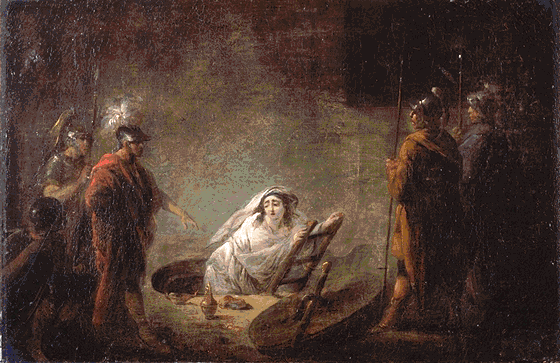
The most awful penalties were visited upon the head of any vestal virgin who was guilty of violating her vows. There is no direct evidence what these penalties were at this early period, but in subsequent years, at Rome, where the vestal virgins resided, the man who was guilty of enticing one of them away from her duty was publicly scourged to death in the Roman forum. For the vestal herself, thus led away, a cell was dug beneath the ground, and vaulted over. A pit led down to this subterranean dungeon, entering it by one side. In the dungeon itself there was placed a table, a lamp, and a little food. The descent was by a ladder which passed down through the pit. The place of this terrible preparation for punishment was near one of the gates of the city, and when all was ready the unhappy vestal was brought forth, at the head of a great public procession,—she herself being attended by her friends and relatives, all mourning and lamenting her fate by the way. The ceremony, in a word, was in all respects a funeral, except that the person who was to be buried was still alive. On arriving at the spot, the wretched criminal was conducted down the ladder and placed upon the couch in the cell. The assistants who performed this service then returned; the ladder was drawn up; earth was thrown in until the pit was filled; and the erring girl was left to her fate, which was, when her lamp had burned out, and her food was expended, to starve by slow degrees, and die at last in darkness and despair.
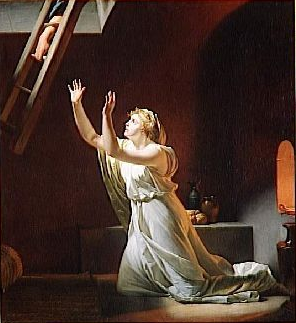
If we would do full justice to the ancient founders of civilization and empire, we should probably consider their enshrinement of Vesta, and the contriving of the ceremonies and observances which were instituted in honor of her, not as the setting up of an idol or false god, for worship, in the sense in which Christian nations worship the spiritual and eternal Jehovah—but rather as the embodiment of an idea,—a principle,—as the best means, in those rude ages, of attracting to it the general regard.
Even in our own days, and in Christian lands, men erect a pole in honor of liberty, and surmount it with the image of a cap. And if, instead of the cap, they were to place a carved effigy of liberty above, and to assemble for periodical celebrations below, with games, and music, and banners, we should not probably call them idolaters. So Christian poets write odes and invocations to Peace, to Disappointment, to Spring, to Beauty, in which they impersonate an idea, or a principle, and address it in the language of adoration, as if it were a sentient being, possessing magical and mysterious powers. In the same manner, the rites and celebrations of ancient times are not necessarily all to be considered as idolatry, and denounced as inexcusably wicked and absurd. Our fathers set up an image in honor of liberty, to strengthen the influence of the love of liberty on the popular mind. It is possible that Æneas looked upon the subject in the same light, in erecting a public fireside in honor of domestic peace and happiness, and in designating maidens to guard it with constant vigilance and with spotless purity. At all events, the institution exercised a vast and an incalculable power, in impressing the minds of men, in those rude ages, with a sense of the sacredness of the domestic tie, and in keeping before their minds a high standard, in theory at least, of domestic honor and purity. We must remember that they had not then the word of God, nor any means of communicating to the minds of the people any general enlightenment and instruction. They were obliged, therefore, to resort to the next best method which their ingenuity could devise.
There were a great many very extraordinary rites and ceremonies connected with the service of the vestal altar, and many singular regulations for the conduct of it, the origin and design of which it would now be very difficult to ascertain. As has already been remarked, the virgins were chosen when very young, being, when designated to the office, not under six nor over ten years of age. They were chosen by the king, and it was necessary that the candidate, besides the above-named requisite in regard to age, should be in a perfect condition of soundness and health in respect to all her bodily limbs and members, and also to the faculties of her mind. It was required too that she should be the daughter of free and freeborn parents, who had never been in slavery, and had never followed any menial or degrading occupation; and also that both her parents should be living. To be an orphan was considered, it seems, in some sense an imperfection.
The service of the vestal virgins continued for thirty years; and when this period had expired, the maidens were discharged from their vows, and were allowed, if they chose, to lay aside their vestal robes, and the other emblems of their office, and return to the world, with the privilege even of marrying, if they chose to do so. Though the laws however permitted this, there was a public sentiment against it, and it was seldom that any of the vestal priestesses availed themselves of the privilege. They generally remained after their term of service had expired, in attendance at the temple, and died as they had lived in the service of the goddess.
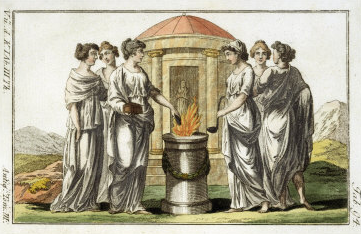
One of the chief functions of the virgins, in their service in the temple, was to keep the sacred fire perpetually burning. This fire was never to go out, and if, by any neglect on the part of the vestal in attendance, this was allowed to occur, the guilty maiden was punished terribly by scourging. The punishment was inflicted by the hands of the highest pontifical officer of the state. The laws of the institution however evinced their high regard for the purity and modesty of the vestal maidens by requiring that the blows should be administered in the dark, the sufferer having been previously prepared to receive them by being partially undressed by her female attendants. The extinguished fire was then rekindled with many solemn ceremonies.
Rhea Silvia, the mother of Romulus, was, we repeat, a vestal virgin. She lived four hundred years after the death of Æneas. During these four centuries, the kingdom had been governed by the descendants of Æneas, generally in a peaceful and prosperous manner, although some difficulties occurred in the establishment of the succession immediately after Æneas’s death. It will be remembered that Æneas was drowned during the continuance of the war. He left one son, and perhaps others. The one who figured most conspicuously in the subsequent history of the kingdom, was Ascanius, the son who had accompanied Æneas from Troy, and who had now attained to years of maturity. He, of course, on his father’s death, immediately succeeded him.
There was some question, however, whether, after all, Lavinia herself was not entitled to the kingdom. It was doubtful, according to the laws and usages of those days, whether Æneas held the realm in his own right, or as the husband of Lavinia, who was the daughter and heir of Latinus, the ancient and legitimate king. Lavinia, however, seemed to have no disposition to assert her claim. She was of a mild and gentle spirit; and, besides, her health was at that time such as to lead her to wish for retirement and repose. She even had some fears for her personal safety, not knowing but that Ascanius would be suspicious and jealous of her on account of her claims to the throne, and that he might be tempted to do her some injury. Her husband had been her only protector among the Trojans, and now, since he was no more, and another, who was in some sense her rival, had risen to power, she naturally felt insecure. She accordingly took the first opportunity to retire from Lavinium. She went away into the forests in the interior of the country, with a very few attendants and friends, and concealed herself there in a safe retreat. The family that received and sheltered her, was that of Tyrrheus, the chief of her father’s shepherds, whose children’s stag Ascanius had formerly killed. Here, in a short time, she had a son. She determined to name him from his father; and in order to commemorate his having been born in the midst of the wild forest scenes which surrounded her at the time of his birth, she called him in full, Æneas of the woods, or, as it was expressed in the language which was then used in Latium, Æneas Silvius. The boy, when he grew up, was always known by this name in subsequent history.
And not only did he himself retain the name, but he transmitted it to his posterity, for all the kings that afterward descended from him, extending in a long line through a period of four hundred years, had the word Silvius affixed to their names, in perpetual commemoration of the romantic birth of their ancestor. Rhea, the mother of Romulus, of whom we have already spoken, of and whom we shall presently have occasion to speak still more, was Rhea Silvia, by reason of her having been by birth a princess of this royal line.

Ascanius, in the mean time, on the death of his father, was for a time so engrossed in the prosecution of the war, that he paid but little attention to the departure of Lavinia. The name of the king of the Rutulians who fought against him was Mezentius. Mezentius had a son named Lausus, and both father and son were personally serving in the army by which Ascanius was besieged in Lavinium. Mezentius had command in the camp, at the head-quarters of the army, which was at some distance from the city. Lausus headed an advanced guard, which had established itself strongly at a post which they had taken near the gates. In this state of things, Ascanius, one dark and stormy night, planned a sortie. He organized a desperate body of followers, and after watching the flashes of lightning for a time, to find omens from them indicating success, he gave the signal. The gates were opened and the column of armed men sallied forth, creeping noiselessly forward in the darkness and gloom, until they came to the encampment of Lausus. They fell upon this camp with an irresistible rush, and with terrific shouts and outcries. The whole detachment were taken entirely by surprise, and great numbers were made prisoners or slain. Lausus himself was killed.
Excited by their victory, the Trojan soldiers, headed by Ascanius, now turned their course toward the main body of the Rutulian army. Mezentius had, however, in the mean time, obtained warning of their approach, and when they reached his camp he was ready to retreat. He fled with all his forces toward the mountains. Ascanius and the Trojans followed him. Mezentius halted and attempted to fortify himself on a hill. Ascanius surrounded the hill, and soon compelled his enemies to come to terms. A treaty was made, and Mezentius and his forces soon after withdrew from the country, leaving Ascanius and Latium in peace.
Ascanius then, after having in some degree settled his affairs, began to think of Lavinia. In fact, the Latian portion of his subjects seemed disposed to murmur and complain, at her having been compelled to withdraw from her own paternal kingdom, in order to leave the throne to the occupancy of the son of a stranger. Some even feared that she had come to some harm, or that Ascanius might in the end put her to death when time had been allowed for the recollection of her to pass in some degree from the minds of men. So the public began generally to call for Lavinia’s return.
Ascanius seems to have been well disposed to do justice in the case, for he not only sought out Lavinia and induced her to return to the capital with her little son, but he finally concluded to give up Lavinium to her entirely, as her own rightful dominion, while he went away and founded a new city for himself. He accordingly explored the country around for a favorable site, and at length decided upon a spot nearly north of Lavinium, and not many miles distant from it. The place which he marked out for the walls of the city was at the foot of a mountain, on a tract of somewhat elevated ground, which formed one of the lower declivities of it. The mountain, rising abruptly on one side, formed a sure defense on that side: on the other side was a small lake, of clear and pellucid water. In front, and somewhat below, there were extended plains of fertile land. Ascanius, after having determined on this place as the site of his intended city, set his men at work to make the necessary constructions. Some built the walls of the city, and laid out streets and erected houses within. Others were employed in forming the declivity of the mountain above into terraces, for the cultivation of the vine. The slopes which they thus graded had a southern exposure, and the grapes which subsequently grew there, were luxurious and delicious in flavor. From the little lake channels were cut leading over the plains below, and by this means a constant supply of water could be conveyed to the fields of grain which were to be sown there, for purposes of irrigation. Thus the place which Ascanius chose furnished all possible facilities both for maintaining, and also for defending the people who were to make it their abode. The town was called Alba Longa, that is long Alba. It was called long to distinguish it from another Alba. It was really long in its form, as the buildings extended for a considerable distance along the border of the lake.
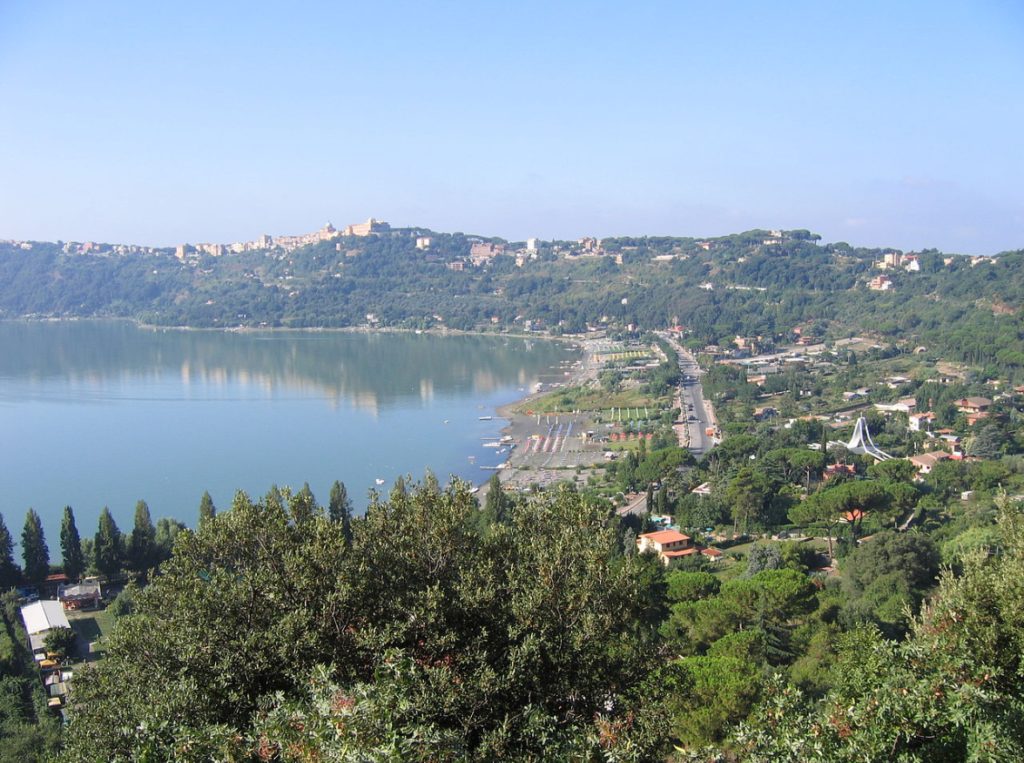
Ascanius reigned over thirty years at Alba Longa, while Lavinia reigned at Lavinium, each friendly to the other and governing the country at large, together, in peace and harmony. In process of time both died. Ascanius left a son whose name was Iulus, while Æneas Silvius was Lavinia’s heir.
There was, of course, great diversity of opinion throughout the nation in regard to the comparative claims of these two princes respectively. Some maintained that Æneas the Trojan became, by conquest, the rightful sovereign of Latium, irrespective of any rights that he acquired through his marriage with Lavinia, and that Iulus, as the son of his eldest son, rightfully succeeded him. Others contended that Lavinia represented the ancient and the truly legitimate royal line, and that Æneas Silvius, as her son and heir, ought to be placed upon the throne. And there were those who proposed to compromise the question, by dividing Latium into two separate kingdoms, giving up one part to Iulus, with Alba Longa for its capital, and the other, with Lavinium for its capital, to Æneas Silvius, Lavinia’s heir. This proposition was, however, overruled. The two kingdoms, thus formed would be small and feeble, it was thought, and unable to defend themselves against the other Italian nations in case of war. The question was finally settled by a different sort of compromise. It was agreed that Latium should retain its integrity, and that Æneas Silvius, being the son both of Æneas and Lavinia, and thus representing both branches of the reigning power, should be the king, while Iulus and his descendants forever, should occupy the position, scarcely less inferior, of sovereign power in matters of religion. Æneas Silvius, therefore, and his descendants, became kings, and as such commanded the armies and directed the affairs of state, while Iulus and his family were exalted, in connection with them, to the highest pontifical dignities.
This state of things, once established, continued age after age, and century after century, for about four hundred years. No records, and very few traditions in respect to what occurred during this period remain. One circumstance, however, took place which caused itself to be remembered. There was one king in the line of the Silvii, whose name was Tiberinus. In one of his battles with the armies of the nation adjoining him on the northern side, he attempted to swim across the river that formed the frontier. He was forced down by the current, and was seen no more. By the accident, however, he gave the name of Tiber to the stream, and thus perpetuated his own memory through the subsequent renown of the river in which he was drowned. Before this time the river was called the Albula.
Another incident is related, which is somewhat curious, as illustrating the ideas and customs of the times. One of this Silvian line of sovereigns was named Alladius. This Alladius conceived the idea of making the people believe that he was a god, and in order to accomplish this end he resorted to the contrivance of imitating, by artificial means, the sound of the rumbling of thunder and the flashes of lightning at night from his palace on the banks of the lake at Alba Longa. He employed, probably, for this purpose some means similar to those resorted to for the same end in theatrical spectacles at the present day. The people, however were not deceived by this imposture, though they soon after fell into an error nearly as absurd as believing in this false thunder would have been; for, on an occasion which occurred not long afterward, probably that of a great storm accompanied with torrents of rain upon the mountains around, the lake rose so high as to produce an inundation, in which the water broke into the palace, and the pretended thunderer was drowned. The people considered that he was destroyed thus by the special interposition of heaven, to punish him for his impiety in daring to assume what was then considered the peculiar attribute and prerogative of supreme divinity. In fact, the rumor circulated, and one historian has recorded it as true, that Alladius was struck by the lightning which accompanied the storm, and thus killed at once by the terrible agency which he had presumed to counterfeit, before the inundation of the palace came on. If he met his death in any sudden and unusual manner, it is not at all surprising that his fate should have been attributed to the judgment of God, for thunder was regarded in those days with an extreme and superstitious veneration and awe. All this is, however, now changed. Men have learned to understand thunder, and to protect themselves from its power; and now, since Franklin and Morse have commenced the work of subduing the potent and mysterious agent in which it originates, to the human will, the presumption is not very strong against the supposition that the time may come when human science may actually produce it in the sky—as it is now produced, in effect, upon the lecturer’s table.

At last, toward the close of the four hundred years during which the dynasty of the Silvii continued to reign over Latium, a certain monarch of the series died, leaving two children, Numitor and Amulius. Numitor was the eldest son, and as such entitled to succeed his father. But he was of a quiet and somewhat inefficient disposition, while his younger brother was ardent and ambitious, and very likely to aspire to the possession of power. The father, it seems, anticipated the possibility of dissension between his sons after his death, and in order to do all in his power to guard against it, he endeavored to arrange and settle the succession before he died. In the course of the negotiations which ensued, Amulius proposed that his father’s possessions should be divided into two portions, the kingdom to constitute one, and the wealth and treasures the other, and that Numitor should choose which portion he would have. This proposal seemed to have the appearance, at least, of reasonableness and impartiality; and it would have been really very reasonable, if the right to the inheritance thus disposed of, had belonged equally to the younger and to the elder son. But it did not. And thus the offer of Amulius was, in effect, a proposition to divide with himself that which really belonged wholly to his brother.
Numitor, however, who, it seems, was little disposed to contend for his rights, agreed to this proposal. He, however, chose the kingdom, and left the wealth for his brother; and the inheritance was accordingly thus divided on the death of the father. But Amulius, as soon as he came into possession of his treasures, began to employ them as a means of making powerful friends, and strengthening his political influence. In due time he usurped the throne, and Numitor, giving up the contest with very little attempt to resist the usurpation, fled and concealed himself in some obscure place of retreat. He had, however, two children, a son and a daughter, which he left behind him in his flight. Amulius feared that these children might, at some future time, give him trouble, by advancing claims as their father’s heirs. He did not dare to kill them openly, for fear of exciting the popular odium against himself. He was obliged, therefore, to resort to stratagem.
The son, whose name was Egestus, he caused to be slain at a hunting party, by employing remorseless and desperate men to shoot him, in the heat of the chase, with arrows, or thrust him through with a spear, watching their opportunity for doing this at a moment when they were not observed, or when it might appear to be an accident. The daughter, whose name was Rhea—the Rhea Silvia named at the commencement of this chapter—he could not well actually destroy, without being known to be her murderer; and perhaps too, he had enough remaining humanity to be unwilling to shed the blood of a helpless and beautiful maiden, the daughter, too, of his own brother. Then, besides, he had a daughter of his own named Antho, who was the playmate and companion of Rhea, and with whose affection for her cousin he must have felt some sympathy. He would not, therefore, destroy the child, but contented himself with determining to make her a vestal virgin. By this means she would be solemnly set apart to a religious service, which would incapacitate her from aspiring to the throne; and by being cut off, by her vestal vows, from all possibility of forming any domestic ties, she could never, he thought, have any offspring to dispute his claim to the throne.
There was nothing very extraordinary in this consecration of his niece, princess as she was, to the service of the vestal fire; for it had been customary for children of the highest rank to be designated to this office. The little Rhea, for she was yet a child when her uncle took this determination in respect to her, made, as would appear, no objection to what she perhaps considered a distinguished honor. The ceremonies, therefore, of her consecration were duly performed; she took the vows, and bound herself by the most awful sanctions—unconscious, however, perhaps, herself of what she was doing—to lead thenceforth a life of absolute celibacy and seclusion.
She was then received into the temple of Vesta, and there, with the other maidens who had been consecrated before her, she devoted herself to the discharge of the duties of her office, without reproach, for several years. At length, however, certain circumstances occurred, which suddenly terminated Rhea’s career as a vestal virgin, and led to results of the most momentous character. What these circumstances were, will be explained in the next chapter.

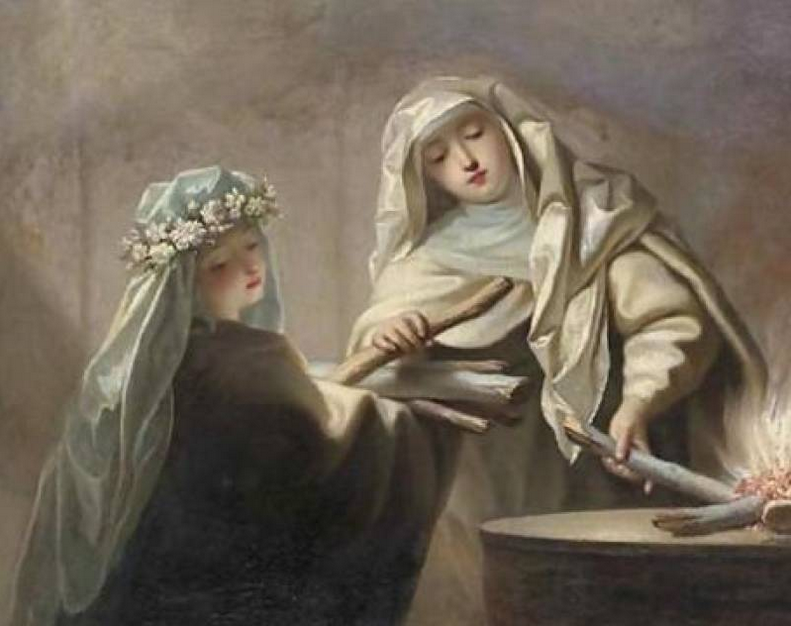








4.5
3.5